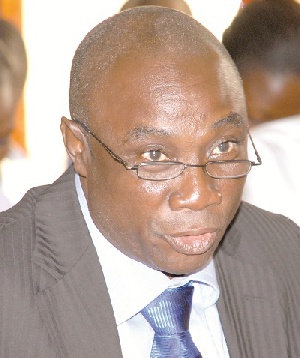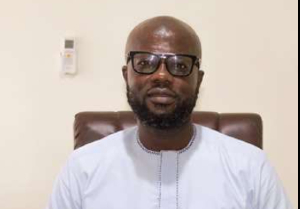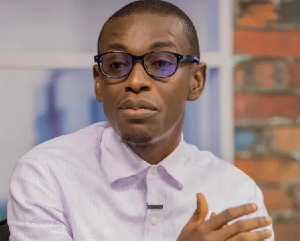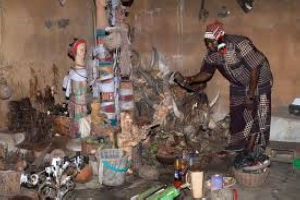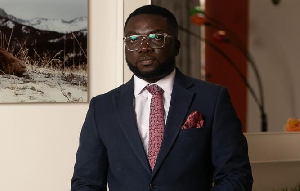Ghana’s Power Ministry has denied a publication by a Norwegian newspaper that the Government of Ghana, represented by the Ministry “entered into an arrangement to secure a 250MW power plant with a company of dubious background” and that “the transaction amount of $510 million is inflated compared to other options.”
Below is the full publication of the Norwegian newspaper VG.no:
Ghana's minister of power does not even bother to lift his eyes when two journalists from the Norwegian newspaper Verdens Gang (VG) enter his huge office at the government quarter in the capital city of Accra.
His desk is covered with large stacks of document that are strewn in front of him. Kwabena Donkor has one cell phone on top of a stack of papers, while a second phone is charging on the windowsill.
It is September 9th, and Donkor is a very busy politician: A crippling energy crisis is playing havoc with Ghana, and it is the minister's job to solve the problem.
Donkor confirmed to VG that the government of Ghana had acquired ten gas turbines from a company called Ameri Group. The minister had signed the contract seven months earlier, which may be the best transaction ever for the mystical Dubai-based company he did his business with.
VG showed the minister a photo of a wanted man; a Pakistani Norwegian named Umar Farooq Zahoor (40). The 40-year-old man from Oslo is wanted by Norwegian and Swiss police for spectacular acts of fraud committed the last ten years.
VG showed the minister a picture, and he pointed to the Pakistani Norwegian right away. He knows him as the head of the Ameri Group.
– I know him; he is the Chief executive of Ameri Group, Donkor says.
Then we show the minister a picture of the man who co-signed the agreement with Umar Farooq Zahoor, a prince from the ruling family in Dubai. The minister has no doubts:
– The sheikh, his royal highness. They both work for Ameri Group, he said.
VG investigated what happened after the wanted man from Norway and the prince from Dubai acquired ten gas turbines for Ghana for 510 million US dollars.
VG’s investigations show that these turbines usually sell for 220 million dollars.
So why did the West African country pay 290 million dollars more than the standard price?
Mohammed Amin Adam, the director of a Ghanaian think tank called Africa Centre for Energy Policy, is highly sceptical.
– If you can help us find out who these people at Ameri Group are we would certainly pursue the case here, he told VG when we met him at his office in Accra.
VG has been following Ameri Group’s tracks for seven months on several continents. The full name of Ameri Group is Africa and Middle East Resources Investment Group.
According to the company website, the company works to develop, co-own and operate power plants in different parts of the world.
The company has apparently achieved spectacular success in a very short period of time. Their website was created two months before the multi-million dollar contract was signed with the government of Ghana.
It's pitch dark in one of Accra’s poorest neighbourhoods, Nima. The sun has set for today, and the electricity is gone. Power can disappear for 24 hours at a time in this impoverished neighbourhood.
Everything goes black, every day, more and more often and for longer periods of time. The energy crisis is very debilitating for the country.
In 2014 alone, Ghana lost over two billion dollars due to the national power crisis, according to a report from Ghana's largest university.
The residents of the neighbourhood told VG just how desperate the situation really was: Electrical systems are damaged, food stored in freezers rots and businesses go bankrupt.
The crisis got so bad last year that the president of Ghana handpicked someone to solve the problem: Dr Kwabena Donkor.
Donkor signed the agreement with Ameri Group six weeks later on the 10th of February this year.
Ameri Group would provide Ghana with ten gas turbines. This procurement would help solve the energy crisis.
The contract was signed by the minister of power and another prominent representative of Ghanaian authorities, Assistant Attorney General and Minister of Justice Dominic Ayine.
VG got its hands on a copy of the agreement, which is 49 pages long. The director who signed for the company in Dubai is now a well-known name among investigators at the Financial Crime Section of the Oslo Police District: Pakistani Norwegian Umar Farooq Zahoor.
As early as 2013, Deputy Chief of Police for Oslo Gro Smogeli singled out Zahoor as a ringleader of one of Norway's boldest and biggest bank frauds ever; the so-called Nordea Swindle.
VG announced today that Farooq Zahoor is also wanted internationally by Norwegian police and Interpol for his leading role in this scam.
The Borgarting Court of Appeal announced its unanimous verdict on 26 November confirming reasonable grounds to suspect the 40-year-old of fraud, as part of organized criminal activity subject to Norway’s mafia activities paragraph.
The Pakistani Norwegian is also wanted for running a fake bank in Switzerland.
Umar Farooq Zahoor portrays himself as a busy and prosperous businessman. His base of operations the past nine years has been the United Arab Emirate of Dubai. He has been living here in a luxurious mansion in one of Dubai’s most fashionable neighbourhoods, as new luxury cars appear in his garage from time to time.
His story began in 1971 when Umar Farooq Zahoor’s father left a small village in Pakistan to try his luck in Europe. He ended up in Oslo. He set up the first immigrant store in the neighbourhood of Grønland, Oslo, together with his wife who joined him in Norway some years later.
20 years later the family owned 5 stores in the same neighbourhood. They sold food, clothing, gold items and ran a travel agency.
The couple had 15 children. Umar was the second oldest son. As the parents ran their businesses, many of their sons learned to be criminals.
Umar was sentenced to one year in prison in 2003 for embezzling airline tickets from his family’s travel agency. The Oslo District Court stated that he had shown clear criminal intent, and that his actions were thoroughly planned and had a professional touch.
Umar Farooq Zahoor did not appear in court. Before the trial the judge had received a letter from the accused asking for a postponement in the case. In the letter, the man from Oslo told the court he was in the midst of business negotiations with bank connections in Switzerland.
Later on the police discovered that he was in full swing at the time with a new and spectacular crime. He had rented office space with a New Zealander in Zürich’s best business, at which they hung up a gilded sign that read Bank.
What customers thought was a real bank would drain its victims for a combined loss of 20 million dollars.
Farooq Zahoor’s business partner was sentenced to three years and six months in prison for this super scam. During his trial, Zahoor’s partner told the Zurich District Court that starting a fake bank was his Farooq Zahoors partner’s idea.
By the time the Swiss police headed off to arrest the Farooq Zahoor he had already moved to his father's country of origin.
Some years later the man from Oslo was on the run again, this time heading for Dubai, where he began his dubious affairs again.
Together with a band of fraudsters he managed to empty the Nordea bank account of a very wealthy widow over the course of 13 days in the summer of 2010. He recieved help from an employee at the bank's branch office in Oslo to withdraw 10 million dollars.
6 million dollars were transferred to two accounts that belonged to a Norwegian businesswoman who lived in Dubai named Sonia Rashid.
On the 25 th of June 2013, nearly three years after this record-breaking fraud, Sonia Rashid admitted to VG that she had withdrawn this money in cash.
She said she gave the millions to Umar Farooq Zahoor.
“Umar was with me when I withdrew the money. He sat in the car while I drove from bank to bank. I went inside the banks and withdrew money that had been transferred to my accounts in Dubai. I gave him the money when I got in the car”, Rashid said.
Despite extensive media coverage in recent years, Zahoor continued to work for major financial institutions in Norway. He has worked the last six years as a consultant for a Norwegian company called NBT ASA, which develops wind power projects in China and in the Karachi area of Pakistan.
The three largest owners of NBT ASA are the corporate finance company Arctic Securities, billionaire Lars Nilsen via his investment company and Kjell Inge Røkke’s Aker Capital AS.
17 September this year: The Greek EPC contractor and industrial group METKA issued a press release from its headquarters in Athens. The company specialises in major energy, infrastructure and defence projects has good news:
They have secured the first major contract in Sub-Saharan Africa. The entrepreneurial giant had opened an office in Ghana's capital city only a few weeks earlier.
METKA is owned by one of the richest dynasties in Greece, the Mytilineos family. According to the press release, the industrial giant had acquired a new partner: Ameri Group.
The Greek corporation informed that its wholly-owned Turkish subsidiary will be providing Ghana with ten brand new gas turbines manufactured by General Electric (GE). In addition to that, the Greeks will be responsible for operation and maintenance of the turbines.
The press release said this is a five-year agreement with the government of Ghana and METKA’s partners in the agreement, Ameri Group.
METKA said their share of the deal exeeds 350 million dollars. This sum is up to 160 million dollars less than the 510 million that Ghana will be paying Ameri for the turbines.
Nobody yet knows who got their hands on this money.
VG has posed several questions to METKA. The company's spokesperson Elli Gardiki replied in an email, saying they cannot speak about the details of this agreement, referring to the press release from September.
– The projects we carry out are complex technical projects, and as such each one is by no means identical. Each project varies significantly depending on many factors, such as overall project scope, delivery time, site and others. No project and no contract is identical and simplified comparisons can lead to wrong conclusions, she stated.
Ameri Energy was presented in the press release from September as part of energy investments made by His Royal Highness Sheikh Ahmed Bin Dalmook Al Maktoum, a member of the ruling family in Dubai.
The press release also stated that the project was made possible with active support from General Electric (GE) in the United States.
GE would not comment on what active support means, VG was told by Communication Manager Ivar Simensen at General Electric Norway.
“METKA will respond to its own press releases”, GE's communication manager said.
GE's spokesperson would not comment on whether they sold gas turbines to the Ameri Group, or what price the turbines were sold for.
Dubai's largest traffic artery is the Sheikh Zayed Road. Its 16 lanes cut right through the city and continue west toward Abu Dhabi.
On the right side of the highway, not far from the Burj Khalifa Skyscraper, lies a weatherworn five-storey building. The Emgate Building consists of business offices and apartments. Until recently one could visit a streetside used car store named Deals on Wheels.
This is where the Ameri Group supposedly has its headquarters. The contract and the company’s websites give this as their main office.
VG has been in contact with the employees of a medical center in the same building. They have never heard of the company.
Umar Farooq Zahoor signed the multi-million dollar contract in Ghana together with Prince of Dubai Sheikh Ahmed Bin Dalmook Al Maktoum. The Arabian prince is named and mentioned frequently in Ameri’s websites. The 40-year-old Pakistani Norwegian is not mentioned anywhere.
Ameri Group’s website states that the company’s affairs are based on trust, integrity and transparency. We are a very ethical corporation and are proud of our work, it states.
The multi-million dollar contract was signed in the greatest secrecy. There were no members of the press present when the contract was entered into. Until now, the name of the person who represented the company was a well-kept secret.
Ameri Group’s website also lists the prince as chairman of the board. The website also maintains that the prince travels to poor countries in the third world and participates in development projects to provide energy solutions for electricity, water and better infrastructure for the inhabitants of those countries.
According to the Ameri Group, the prince’s motto is: a better world for the less fortunate.
Director Mohammed Amin Adam of the think tank Africa Centre for Energy Policy (ACEP) does not believe this agreement will make the world a better place.
On the contrary, he is very critical to the agreement between the Ghanaian government and Ameri Group.
According to the agreement, Ghana will lease the ten gas turbines for five years. After that, Ghana becomes owner of the turbines after paying an equipment cost of 510 million dollars.
– That same equipment could have been purchased for 220 million dollars. The Ghanaian authorities would have saved 290 million dollars, said Amin Adam.
– Why did the authorities decide to trust Ameri Group?
– It makes no sense economically. We think someone is making money on of this deal, but we do not have any evidence yet, the head of the think tank said.
In addition to an equipment price of 510 million dollars, Ghana will pay variable costs of 16 million dollars annually, according to a report from the National Assembly of Ghana. Ghana will also need to pay for the gas to power the ten turbines.
According to the agreement the ten gas turbines are type TM2500 , often referred to as a power plant on wheels.
VG’s investigations show that the standard price for these turbines is about 20 million dollars. Last summer, GE sold eight identical turbines to Sonelgaz, the state energy company in Algeria, for 161 million dollars.
Professor Olav Bolland is one of Norway's foremost experts on gas power plants.
– This is one of the world's most popular turbines, if not the most common, he said.
– A simple internet search indicates that they sell for about 22 million dollars each. That seems to be a reasonable price if you ask me based on my previous experience pricing power plants.
He leads the Institute of Energy and Process Engineering at the Norwegian University of Science and Technology (NTNU).
The agreement was sent to the National Assembly for approval after the government had signed the agreement with Ameri Group.
The minister's delegation reported to Ghanaian elected representatives that a direct purchase of the ten turbines would cost 411 million dollars. This amount is almost double the standard price for such turbines on the world market.
A crucial reason for choosing Ameri Group, was that the company could deliver the turbines quickly, while it would take nine months or a year for GE to manufacture ten turbines, the minister said.
But it was not until late October (eight months after the agreement was signed) that the turbines were unloaded at the Port of Accra.
From there they were transported to a power station in the west, where they are now being connected to the power grid and soon ready to produce electricity.
The minister of power have argued to VG that he did nothing wrong when he signed the agreement with the mysterious company:
– I would not get involved in anything that is not good for Ghana, he said.
VG made a number of attempts to get Umar Farooq Zahoor, the prince and Ameri Group to explain why Ghana had to pay such an enormous price. Neither the prince nor the wanted Oslo man have responded to VG’s enquiries.
After sending an email to the address listed on the company’s website, someone named Kate spoke on behalf of Ameri Group saying:
– Mr Umar stopped working for our company a few months ago to pursue bigger business opportunities.
The mysterious company does not want to answer VG’s question:
– We are a privately held company in Dubai that does business all over the world, also in Ghana. We see no reason to answer any of your questions. We do not understand why a Norwegian newspaper would be interested in what we do, she writes.
Not many inhabitants of the Accra slum care anymore.
“They are all corrupt thieves!”
Head of the neighbourhood council, Aziz Haruna, is furious over his countries politicians.
It's six o'clock in the evening and power in the city's most densely-populated neighbourhood has just gone.
Like so many others in this neighbourhood, Haruna has lost faith in politics and politicians. He waves his arms and says:
– Our politicians are stealing our country's resources. If you want to be rich in Ghana, you need to become a politician.
Source: VG.no
And below is the Power Ministry’s full denial statement:
MINISTRY OF POWER
STATEMENT ON FALSE PUBLICATIONS ABOUT AMERI ENERGY POWER PROJECT
The Ministry of Power has noted publications in sections of the media attributed to a Norwegian newspaper, VG. The thrust of these publications is that:
1. The Ministry of Power representing Government entered into an arrangement to secure a 250MW power plant with a company of dubious background.
2. That the transaction amount of $510 million is inflated compared to other options.
The Ministry wishes to state that these publications are false, misleading and a gross misrepresentation of the facts. For the avoidance of doubt, the Ministry of Power wishes to clarify the matter as follows:
ISSUE OF COST OF PLANT
• The Ministry wishes to state that the agreement with AMERI is a Build, Own, Operate and Transfer (BOOT) agreement and not an outright purchase of generating plants. • The Government of Ghana has not made ANY PAYMENTS to AMERI and will not be making any payments for the cost of the equipment.
• Per the agreement with AMERI, the Government of Ghana through the Volta River Authority (VRA) will only make payments to Ameri for power produced and supplied to the VRA just like any other Independent Power Producer (IPP).
• Also, per the agreement, Government was required to provide a standby Letter of Credit (LC) for an amount of US$51 million, which LC has been raised.
• Ghana will however assume eventual ownership of the equipment after five (5) years of production and sale of the power to the VRA.
• It must also be explained that the quoted price of $220 million in the Norwegian story for outright purchase of similar turbines is exclusive of all other costs such as auxiliaries, balance of plant, civil works, sub-station, installation of equipment, cost of financing, operation and maintenance etc.
• Under the agreement with AMERI Energy, the cost of all these auxiliary works is being borne by AMERI Energy.
• From the foregoing, it is false to claim that the Government of Ghana signed a $510 million agreement for the plant, when it should have been $220 million.
• On claims that the manufacturers of the plant, GE, could have been contacted to negotiate a direct purchase, the Ministry wishes to state that an earlier offer from GE Consortium to the VRA for similar equipment on rental basis proved to be far more expensive and was therefore rejected by the VRA.
ISSUE OF DUE DILIGENCE ON AMERI ENERGY POWER PLANT
• The Government of Ghana has not entered into any agreement with Umar Farooq Zahoor. The Government of Ghana has an agreement with AMERI Energy.
• The Chairman of AMERI Energy is Sheikh Mohamed AL Maktoum who signed the agreement for his firm. Umar Farooq signed as a witness for him. • The Bank of Ghana before establishing the Standby LC conducted its own due diligence on AMERI Energy.
• The American firm, JP Morgan also independently conducted its own due diligence before confirming the Standby LC for the project.
• Government of Ghana represented by the Ministry of Power and the Attorney General’s Department also conducted due diligence on AMERI Energy and reviewed strenuously the project agreement before submitting to Parliament.
• Parliament, upon receipt of relevant documentation on the project and the agreement, also scrutinized and reviewed the agreement before approving it at the Committee Level unanimously and later by the House.
CONCLUSION
The Ministry of Power will continue to work assiduously to end the current power sector challenges. In doing so we expect all stakeholders to commit to the noble path of resolving this national challenge instead of throwing in misleading claims programmed to disrupt and derail its efforts.
We wish to reiterate that as part of efforts to resolve the current load shedding exercise, the following are underway:
• 225MW Karpower Barge is ramping up generation to attain the contracted generation capacity.
• The 250MW AMERI Plant is undergoing commissioning.
• The first unit of the 220MW Kpone Thermal Plant is also undergoing commissioning.
• The 12OMW TICO Steam Expansion has been completed.
• The first part of 120MW of the 360MW Sunon Asogli Plant is near completion.
Dr. Kwabena DONKOR
MINISTER FOR POWER
ACCRA
December 14, 2015.
General News of Monday, 14 December 2015
Source: classfmonline.com

